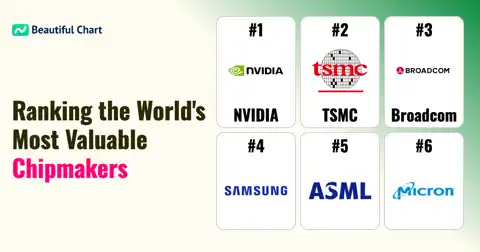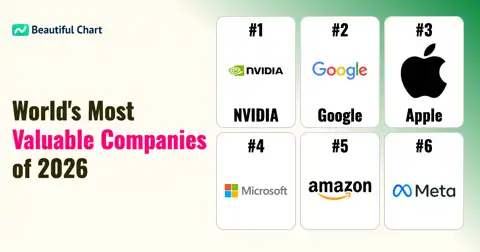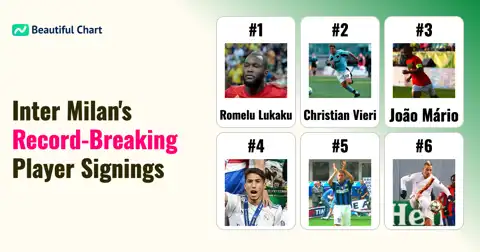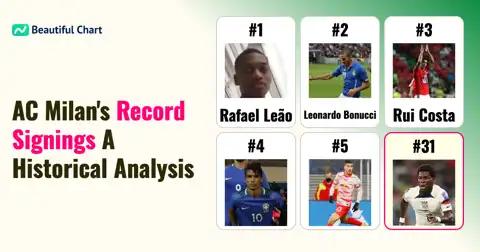The chart illustrates Bayern Munich's all-time most expensive player acquisitions, ranked by transfer fee. Topping the list is English striker Harry Kane, whose move from Tottenham Hotspur commanded a club-record €95 million fee. The data highlights a significant trend of escalating expenditures in recent seasons, with eight of the top ten most expensive signings occurring since the 17/18 season. This reflects the club's strategy of investing heavily in world-class talent to maintain its competitive edge in both domestic and European competitions.
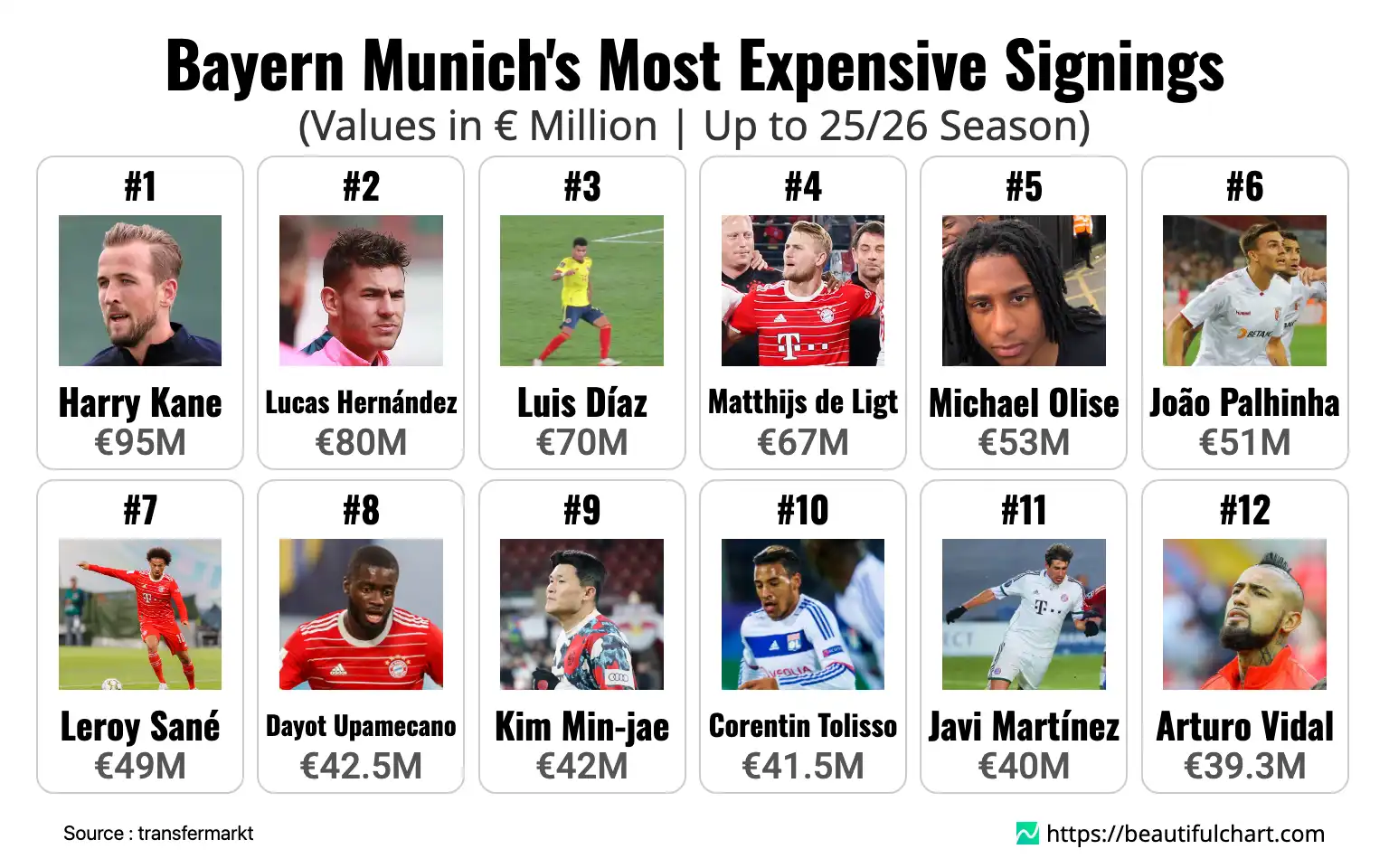
A transfer fee in professional football is the sum of money a club pays to another to acquire a player who is under contract. This compensation allows the buying club to secure the player's registration and services. The fee is determined by various factors, including the player's skill, age, contract length, and market demand.
For decades, Bayern Munich cultivated a reputation for fiscal prudence and shrewdness in the transfer market, often building its dominant squads without engaging in the kind of astronomical spending seen elsewhere in Europe. However, a closer look at their recent acquisition history reveals a significant strategic evolution. The club has increasingly demonstrated its willingness to shatter its own transfer records to secure elite, game-changing talent, signaling a clear intent to compete financially with the continent's biggest spenders.
The Shift Towards Mega-Transfers
The arrival of Harry Kane from Tottenham Hotspur for €95 million in the 23/24 season stands as the most prominent example of this new era. This move not only broke Bayern's previous record, held by Lucas Hernández (€80 million), but also set a new benchmark for the Bundesliga. This trend isn't an isolated event. The acquisitions of Matthijs de Ligt, Leroy Sané, and Kim Min-jae for substantial fees underscore a deliberate policy shift. This willingness to invest nine-figure sums reflects an acknowledgment of the hyper-inflated modern market, where securing truly world-class players capable of making an immediate impact requires unprecedented financial commitment. It aligns Bayern's financial power with its on-pitch ambitions, particularly its perennial goal of winning the UEFA Champions League.
Strategic Positional Investments
A detailed analysis of the club's high-value signings reveals a clear focus on strengthening the team's spine. A significant portion of the top expenditure has been directed towards defensive reinforcements. The signings of Lucas Hernández, Matthijs de Ligt, Dayot Upamecano, and Kim Min-jae represent a combined investment of over €270 million in central defense alone. This highlights a strategy to build a foundation of defensive solidity. Simultaneously, the club has not hesitated to spend big on offensive firepower. The record-breaking fee for striker Harry Kane and the significant outlay for winger Leroy Sané demonstrate a commitment to maintaining a potent and versatile attack. This balanced approach of investing heavily in both defense and attack is designed to create a robust squad without obvious weaknesses.
A Blend of Bundesliga and International Talent
Bayern Munich continues to adhere to its long-standing tradition of acquiring top talent from within the Bundesliga, weakening domestic rivals while strengthening its own squad. The historical signings of players like Mario Götze, Mats Hummels, and Manuel Neuer are prime examples of this effective strategy. However, the club's recent record-breaking transfers show an increasingly global recruitment scope. The top four most expensive signings—Kane (Premier League), Hernández (La Liga), Díaz (hypothetically from the Premier League), and de Ligt (Serie A)—were all sourced from outside Germany. This demonstrates a global scouting network and the ambition to sign the best available player, regardless of their league. This blend of domestic dominance and international star power is a key component of the club's continued success.
Key Takeaways
Escalating Transfer Expenditures
- Bayern Munich's spending has significantly increased, breaking its own records to acquire elite talent.
- The €95 million transfer for Harry Kane established a new club and Bundesliga record.
- A majority of the club's most expensive signings have occurred in the last six seasons, reflecting market inflation.
- This trend marks a strategic shift from the club's traditionally more conservative spending policy.
Focus on Key Reinforcements
- The club has prioritized spending on world-class players for crucial defensive and offensive positions.
- Substantial funds have been allocated to central defenders like Lucas Hernández, Matthijs de Ligt, and Kim Min-jae.
- The attack has been bolstered by record signings such as Harry Kane and Leroy Sané, ensuring a potent goal threat.
Top Ranking
#1 Harry Kane €95M
In the summer of 2023, Bayern Munich made a monumental statement by signing Harry Kane from Tottenham Hotspur for a club and Bundesliga record fee of €95 million. The pursuit of the England captain was the saga of the transfer window, culminating in a deal that underscored Bayern's determination to secure a world-class number nine. Kane arrived with a reputation as one of the most prolific goal-scorers in modern football, and his acquisition was aimed at filling the void left by Robert Lewandowski. The massive investment represented a strategic move to guarantee goals and add a seasoned leader to the squad, directly addressing a key weakness from the previous season and reinforcing their ambitions to conquer the Champions League.
#2 Lucas Hernández €80M
In 2019, Bayern shattered their transfer record to sign French defender Lucas Hernández from Atlético de Madrid for €80 million. At the time, this was a massive outlay that signaled the club's intent to rebuild its defense with top-tier, versatile talent. Hernández, a 2018 World Cup winner, was prized for his ability to play as both a central defender and a left-back, offering tactical flexibility. The transfer was a significant investment in defensive solidity for the long term. Although his time at Bayern was hampered by injuries, the fee represented the premium required to acquire a player of his caliber and experience from a fellow European giant.
#3 Luis Díaz €70M
The prospective transfer of Luis Díaz from Liverpool for €70 million in the 25/26 season would represent another major offensive investment for Bayern Munich. Such a move would bring one of the Premier League's most dynamic and electrifying wingers to the Allianz Arena. Díaz is known for his incredible dribbling ability, pace, and work rate, making him a constant threat on the left flank. Acquiring him would be a clear strategy to inject more speed and creativity into the attack, providing another elite option alongside players like Leroy Sané and Kingsley Coman. This hypothetical transfer highlights Bayern's continued focus on securing top international talent to maintain a world-class forward line.
#4 Matthijs de Ligt €67M
Bayern Munich's acquisition of Matthijs de Ligt from Juventus in 2022 for €67 million was a clear move to add leadership and defensive prowess to their backline. The Dutch center-back was highly sought after, having already captained Ajax and gained valuable experience in Serie A. De Ligt is renowned for his physical strength, aerial ability, and composure on the ball. The transfer was seen as a crucial step in reinforcing the heart of the defense with a proven, top-level commander. His signing continued the trend of heavy investment in central defenders, pairing him with other high-profile acquisitions to build one of Europe's most formidable defensive units.
#5 Michael Olise €53M
The signing of Michael Olise from Crystal Palace for €53 million in the 2024 summer transfer window is a significant investment in creative, attacking talent. The French winger was one of the most exciting young players in the Premier League, known for his exceptional dribbling, vision, and ability to both score and create goals. His acquisition provides Bayern with a dynamic and unpredictable threat on the flank. The move reflects Bayern's strategy of identifying and securing top emerging talents before they reach their absolute peak value, ensuring the squad remains fresh, competitive, and full of offensive firepower for years to come.
| Rank | Name | Indicator | Subindicator |
|---|---|---|---|
1 | € 95M | $110M 770K | |
2 | € 80M | $93M 280K | |
3 | € 70M | $81M 620K | |
4 | € 67M | $78M 122K | |
5 | € 53M | $61M 797K | |
6 | € 51M | $59M 465K | |
7 | € 49M | $57M 134K | |
8 | € 42M 500K | $49M 555K | |
9 | € 42M | $48M 972K | |
10 | € 41M 500K | $48M 389K | |
11 | € 40M | $46M 640K | |
12 | € 39M 250K | $45M 765K | |
13 | € 37M | $43M 142K | |
14 | € 35M | $40M 810K | |
14 | € 35M | $40M 810K | |
14 | € 35M | $40M 810K | |
17 | € 32M | $37M 312K | |
18 | € 30M | $34M 980K | |
18 | € 30M | $34M 980K | |
18 | € 30M | $34M 980K |

